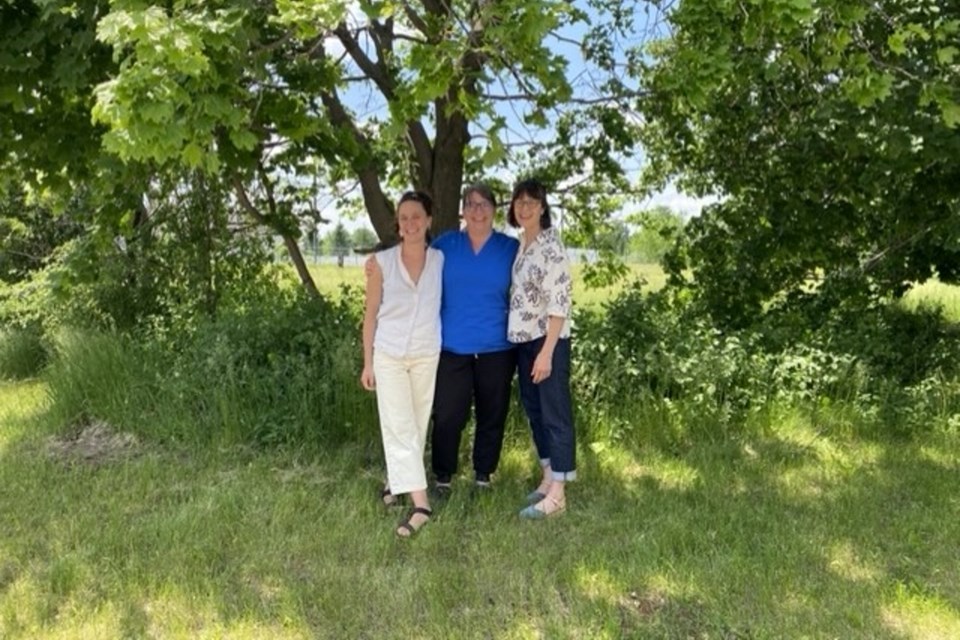When it comes to prenatal, postnatal and reproductive health, it’s not always easy for marginalized community members to access the care they need.
That’s why three local midwives started the fast-growing Community Access Midwifery Program (CAMP).
“We identified that there’s a huge gap in this community. There are currently no programs, specifically prenatal or pregnancy-specific, for the racialized and newcomer population,” said one of the midwives, Isomi Henry.
It was launched about a year and a half ago by Henry, Emily Stewart-Wilson and Rebecca Carson – all of whom are affiliated with Family Midwifery Care, and the program has since “exploded.”
So far, they’ve helped more than 50 patients from marginalized groups in Guelph, including newcomers, racialized individuals, those experiencing poverty or homelessness and people with substance and mental health issues.
But the demand is so high, they’ve been getting more referrals than they can keep up with.
In response, they recently partnered with Guelph Community Health (GCH) to expand the program, submitting a joint application for an Expanded Midwifery Care model through the Ministry of Health.
If it’s approved, they’ll have funding for four full-time midwives to run CAMP out of GCH.
“Because currently, the three of us are still working through family midwifery care,” she said.
The expansion would grow their reach “more than fourfold,” because right now they’re mostly doing acute emergency care.
“What we want to move to is more preventive health care,” she said, for things like sexual health and contraception counselling.
“We have started (a) postpartum group, but that's just the tip of the iceberg with mental health and isolation that newcomers and people are facing now with the pandemic. There’s just so much we can do that we don’t have time for right now.”
In some instances, the patients they work with haven’t received any prenatal care for the duration of their pregnancy.
“This has happened a couple of times, and we attend them at birth,” she said. “And because of the complex life, sometimes people leave right away, then don’t want care afterwards, or maybe we’ll see them one other time to make sure their (postnatal) bleeding is appropriate or that they have basic needs like clean underwear and sanitary napkins and some pain medication.”
This type of sporadic care is different from what midwives typically offer.
In Ontario, midwives work in a “basic course of care,” or BCC, meaning they provide care during pregnancy and labour, as well as postnatal care for six to eight weeks.
While she said routine care “is a great model, it really fits specific people, who know they’re pregnant right away, have access to resources, and can call us when they know they’re five or six weeks pregnant – because if not, we fill up pretty quick.”
But the CAMP program provides episodic care, with no commitment required. Patients can have just one appointment, or several, it’s up to them, and all costs are covered by the Ministry of Health.
Patients don’t need to be registered with a clinic to access CAMP services; community service providers or the patient can contact CAMP directly to access services.
The services they offer include pregnancy tests, STI screening, miscarriage care, pregnancy check-ups, postpartum care, home baby checks and pregnancy termination.
“Because of this program, we have the luxury of being able to provide (episodic) care and where they want. Often they've had negative experiences with the larger healthcare system, so they're really reluctant to go to the hospital (or) unable to make a scheduled clinic appointment due to lifestyle.”
That means they have the flexibility to meet patients where they want, where they feel safest, like in a shelter, a health centre, sometimes even in parks or other community spaces.
She hopes they’ll hear back by spring 2023 as to whether or not the program gets the funding from the Ministry of health to expand.
You can learn more about CAMP here.
